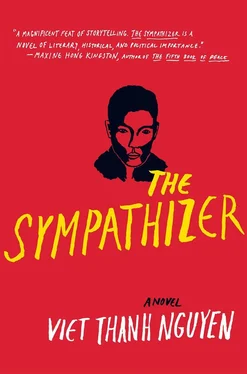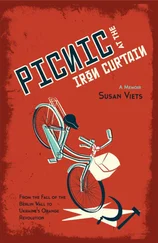It was then, hesitating in the parking lot with my arms wrapped protectively around my paper bag of treasures, that I spotted a pay phone. The urge to call Sofia Mori nagged at me. I had been delaying it for some perverse reason, playing hard to get even though she had no idea I was here to be gotten. Rather than waste a dime and call her, I jumped into my car and drove across the great expanse of Los Angeles. I felt somewhat at peace after having made my blood payment to the crapulent major’s widow, and as I sped down the freeway, sparse with traffic in the postprandial hours, I heard the crapulent major’s ghost chortling in my ear. I parked my car down the crowded street from Ms. Mori’s apartment and took my paper bag of treasures with me, except for the Playboy , which I left in the rear seat for the crapulent major’s ghost, opened to the centerfold of Miss June sprawled fetchingly on a stack of hay with nothing on except cowgirl boots and a neckerchief.
Ms. Mori’s neighborhood was as I remembered it, beige houses with fading toupees of lawn and gray apartment buildings with the institutional charm of army barracks. The lights glowed in her apartment, the scarlet curtains pulled shut. When she opened the door, the first thing I noticed was her hair, grown down to her shoulders and no longer permed but straight, rendering her younger than I remembered, an effect compounded by her simple clothes, a black T-shirt and blue jeans. It’s you! she cried, opening her arms to me. When we embraced, it all came back, her use of baby powder instead of perfume, her perfect body temperature, her small, plush breasts, usually encased in bras well padded enough to handle fragile objects, but tonight free of all such restraint. Why didn’t you call? Come in. She pulled me inside the familiar, minimally decorated apartment, furnished in the spirit of revolutionary self-denial she admired in the likes of Che Guevara and Ho Chi Minh, men who traveled light. The largest piece of furniture she owned was a foldable futon in the living room on which her black cat usually sat. This cat had always kept her distance from me. This was not due to fear or respect, for whenever Ms. Mori and I made love, the cat perched on the nightstand and evaluated my performance with disdainful green eyes, occasionally spreading a paw and licking between her bared claws. The cat was present, but she was not lounging directly on the futon. Instead she lay on the lap of Sonny, who sat on the futon with legs crossed underneath himself, barefooted. He grinned apologetically, but nevertheless exuded an aura of ownership as he shooed the cat off his lap and rose. It’s good to see you again, old friend, he said, extending his hand. Sofia and I talk often about you.
What did I expect? I had been missing for seven months and had never once phoned, the extent of my communication a few scribbled postcards. As for Ms. Mori, she was dedicated to neither monogamy nor man, much less to any one man in particular. She declared her allegiances through the most prominent furnishings in her living room, bookshelves bowed as the backs of coolies with the weight of Simone de Beauvoir, Anaïs Nin, Angela Davis, and other women who had wrestled with the Woman Question. Western men from Adam to Freud had also asked that question, although they had phrased it as “What does woman want?” At least they had considered the subject. It occurred to me only then that we Vietnamese men never even bothered to ask what woman wanted. I had not even a germ of an idea about what Ms. Mori wanted. Perhaps I would have had a dim sense if I had read some of these books, but all I knew of them were the summaries found on their dust jackets. My intuition told me Sonny had actually read some of them in their entirety, and taking a seat next to him I could feel an anaphylactic reaction to his presence prickling on my skin, an eruption of hostility inflamed by his genial smile.
What do you have there? Sonny said, nodding at the paper bag on my lap. Ms. Mori had gone to fetch another wineglass. A pair already sat on the coffee table, along with an open bottle of red wine, a corkscrew with the wine-bloodied cork still skewered on it, and a photo album. Cigarettes, I said, taking out the carton. And vodka.
I had no choice but to offer Sonny the vodka, which he showed to Ms. Mori when she returned from the kitchen. You shouldn’t have, she said brightly, putting it next to the bottle of wine. The beautiful, transparent Stolichnaya maintained a stoic Russian demeanor as we regarded it in silence. Every full bottle of alcohol has a message in it, a surprise that one will not discover until one drinks it. I had planned to read that bottle’s message with Ms. Mori, as was obvious to her and Sonny, and we might have all simply sat there soaking in the frigid waters of embarrassment if it had not been for Ms. Mori’s grace. It’s very thoughtful of you, she said. Especially as we’ve almost run out of cigarettes. I’ll have one, if you don’t mind.
So, Sonny said, how was your trip to the Philippines?
I want to hear all about it, Ms. Mori said, pouring me a glass of wine and refilling theirs. I’ve always wanted to go ever since my uncle talked about his time there in the war. I cracked open the carton and offered her a cigarette, took one myself, and began my well-rehearsed tale. The cat yawned in regal contempt, climbed back onto Sonny’s lap, stretched out, sneered at me, then fell asleep from boredom. I had the distinct impression that Sonny and Ms. Mori were only marginally more interested as they listened to me, smoked my cigarettes, and asked some polite questions. Dispirited, I did not even have the heart to tell them about my near-death experience, and my story tapered off without a climax. My gaze fell on the photo album, which was open to a page of black-and-white photos depicting middle-class scenes from a few decades earlier: a father and a mother at home in their lace-covered armchairs, their sons and daughters playing the piano, crocheting, gathered around a dining table for a meal, wearing the fashion and hairstyle of the thirties. Who are they? I said. My family, said Ms. Mori. Your family? The answer stupefied me. Of course I knew that Ms. Mori had a family, but she rarely talked about them, and certainly had never shown me photographs of them. All I knew was that they lived far north of here, in one of the dusty, hot San Joaquin valley towns. That’s Betsy and that’s Eleanor, Sonny said, leaning over to point at the relevant faces. Here’s George and Abe. Poor Abe.
I looked at Ms. Mori, sipping her wine. He died in the war?
No, she said. He refused to go to war. So he got sent to prison instead. He’s still bitter about it. Not that he shouldn’t be. God knows I’d probably be bitter if I were him. I’d just like for him to be happier than he is. The war’s thirty years past and it still lives with him, even though he didn’t go and fight.
He fought, Sonny said. He just fought at home. Who can blame him? The government puts his family in a camp and then asks him to go fight for the country? I’d be mad as hell, too.
A mist of smoke now separated the three of us. The faint eddies of our thoughts took fleeting, evanescent material shape, and for a brief moment a ghostly version of myself hovered over Sonny’s head. Where’s Abe now? I said.
Japan. Not that he’s any happier there than he was here. After the war ended and he was freed, he thought he’d go back to his people, the way that he’d been told to all his life by white people, even though he was born here. So he went and found out that the people in Japan didn’t think he was one of them, either. To them he’s one of us, and to us he’s one of them. Neither one thing nor another.
Maybe our Department Chair can help him, I said.
Читать дальше












